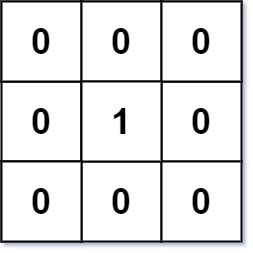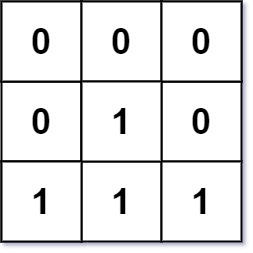156 lines
3 KiB
Markdown
156 lines
3 KiB
Markdown
# Leetcode 01-Matrix
|
|
|
|
#### 2022-07-17 03:15
|
|
|
|
> ##### Algorithms:
|
|
>
|
|
> #algorithm #BFS
|
|
>
|
|
> ##### Data structures:
|
|
>
|
|
> #DS #vector_2d
|
|
>
|
|
> ##### Difficulty:
|
|
>
|
|
> #coding_problem #difficulty_medium
|
|
>
|
|
> ##### Additional tags:
|
|
>
|
|
> #leetcode #CS_list_need_understanding
|
|
>
|
|
> ##### Revisions:
|
|
>
|
|
> 2022-09-20
|
|
|
|
##### Related topics:
|
|
|
|
##### Links:
|
|
|
|
- [Link to problem](https://leetcode.com/problems/01-matrix/)
|
|
|
|
---
|
|
|
|
### Problem
|
|
|
|
Given an `m x n` binary matrix `mat`, return _the distance of the nearest_ `0` _for each cell_.
|
|
|
|
The distance between two adjacent cells is `1`.
|
|
|
|
#### Examples
|
|
|
|
**Example 1:**
|
|
|
|

|
|
|
|
```
|
|
**Input:** mat = [[0,0,0],[0,1,0],[0,0,0]]
|
|
**Output:** [[0,0,0],[0,1,0],[0,0,0]]
|
|
```
|
|
|
|
**Example 2:**
|
|
|
|

|
|
|
|
```
|
|
**Input:** mat = [[0,0,0],[0,1,0],[1,1,1]]
|
|
**Output:** [[0,0,0],[0,1,0],[1,2,1]]
|
|
```
|
|
|
|
#### Constraints
|
|
|
|
- `m == mat.length`
|
|
- `n == mat[i].length`
|
|
- `1 <= m, n <= 104`
|
|
- `1 <= m * n <= 104`
|
|
- `mat[i][j]` is either `0` or `1`.
|
|
- There is at least one `0` in `mat`.
|
|
|
|
### Thoughts
|
|
|
|
> [!summary]
|
|
> This is a #BFS problem, because it needs to find
|
|
> a smallest distance
|
|
|
|
#### Why not DFS
|
|
|
|
I tried with DFS, but
|
|
|
|
1. it is not suitable for finding smallest distance
|
|
2. and is easy to go into a infinite loop.
|
|
3. Also, it is hard to determine whether to revisit (update)
|
|
the distance.
|
|
|
|
#### BFS
|
|
|
|
> [!tip]
|
|
> Search from 0 instead of 1, can make it easier.
|
|
|
|
Start searching from 0s, because the search direction matters.
|
|
|
|
pseudo code:
|
|
|
|
- Initialization stage:
|
|
|
|
- add every 0 to queue
|
|
- make every 1 a infinite large number, (10001 this case)
|
|
|
|
- while queue is not empty
|
|
- check for neighbors
|
|
- if OOB (Out of Bound), skip
|
|
- if the value of neighbor's distance is higher than
|
|
the node, update it, and add it to queue(also update
|
|
his neighbors)
|
|
|
|
### Solution
|
|
|
|
```cpp
|
|
class Solution {
|
|
const int MAX = 10002;
|
|
|
|
public:
|
|
vector<vector<int>> updateMatrix(vector<vector<int>> &mat) {
|
|
// Shouldn't use DFS, since DFS is likely to run into a loop
|
|
queue<pair<int, int>> todo;
|
|
int m = mat.size(), n = mat[0].size();
|
|
for (int i = 0; i < m; i++) {
|
|
for (int j = 0; j < n; j++) {
|
|
if (mat[i][j] == 0) {
|
|
todo.push({i, j});
|
|
} else {
|
|
mat[i][j] = MAX;
|
|
}
|
|
}
|
|
}
|
|
|
|
int offset[] = {-1, 1};
|
|
int x, y;
|
|
int newX, newY;
|
|
int dist;
|
|
while (!todo.empty()) {
|
|
x = todo.front().first;
|
|
y = todo.front().second;
|
|
todo.pop();
|
|
dist = mat[x][y];
|
|
|
|
for (int i : offset) {
|
|
newX = x + i;
|
|
if (newX < m && newX >= 0) {
|
|
if (mat[newX][y] > dist + 1) {
|
|
mat[newX][y] = dist + 1;
|
|
todo.push({newX, y});
|
|
}
|
|
}
|
|
newY = y + i;
|
|
if (newY < n && newY >= 0) {
|
|
if (mat[x][newY] > dist + 1) {
|
|
mat[x][newY] = dist + 1;
|
|
todo.push({x, newY});
|
|
}
|
|
}
|
|
}
|
|
}
|
|
return mat;
|
|
}
|
|
};
|
|
```
|